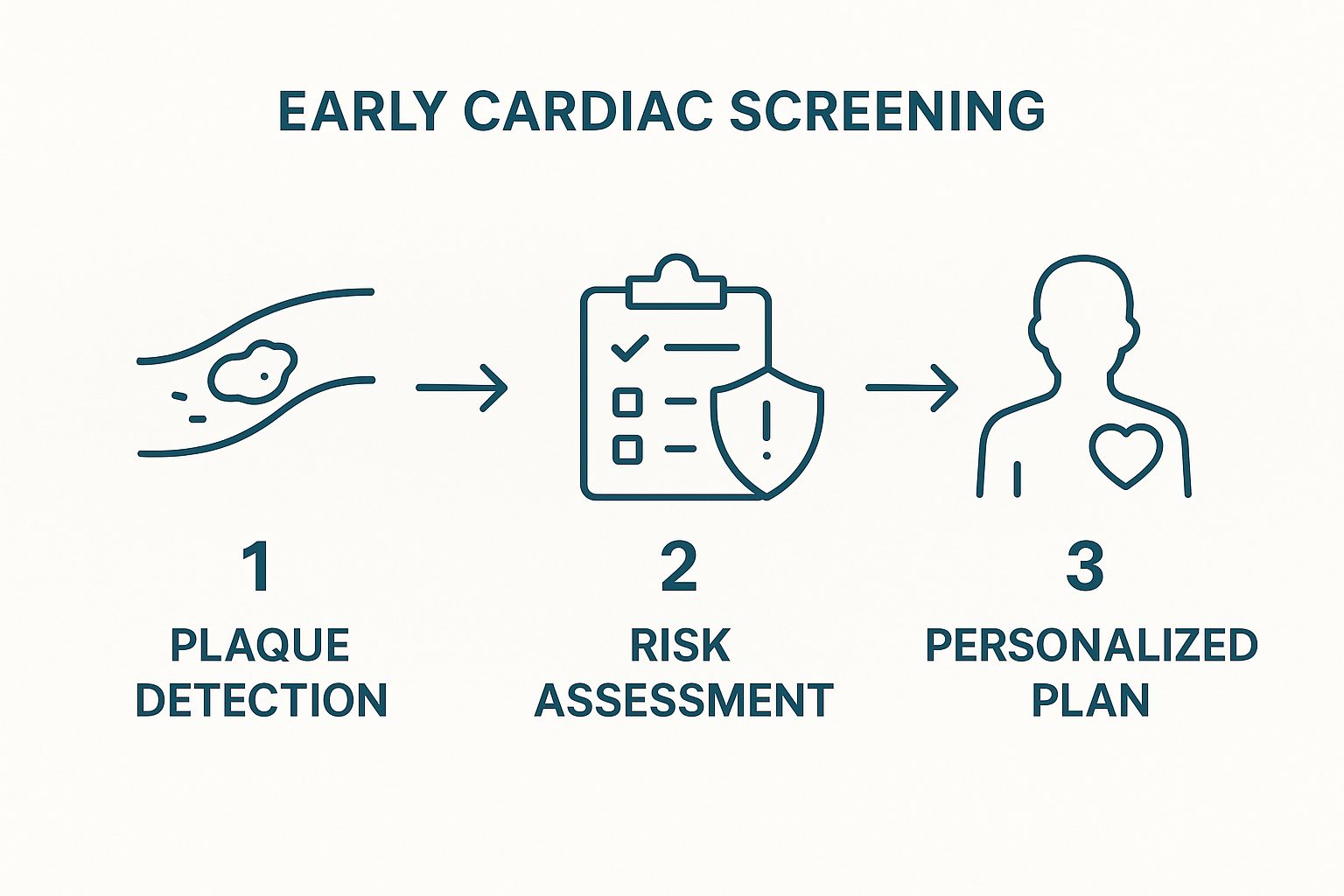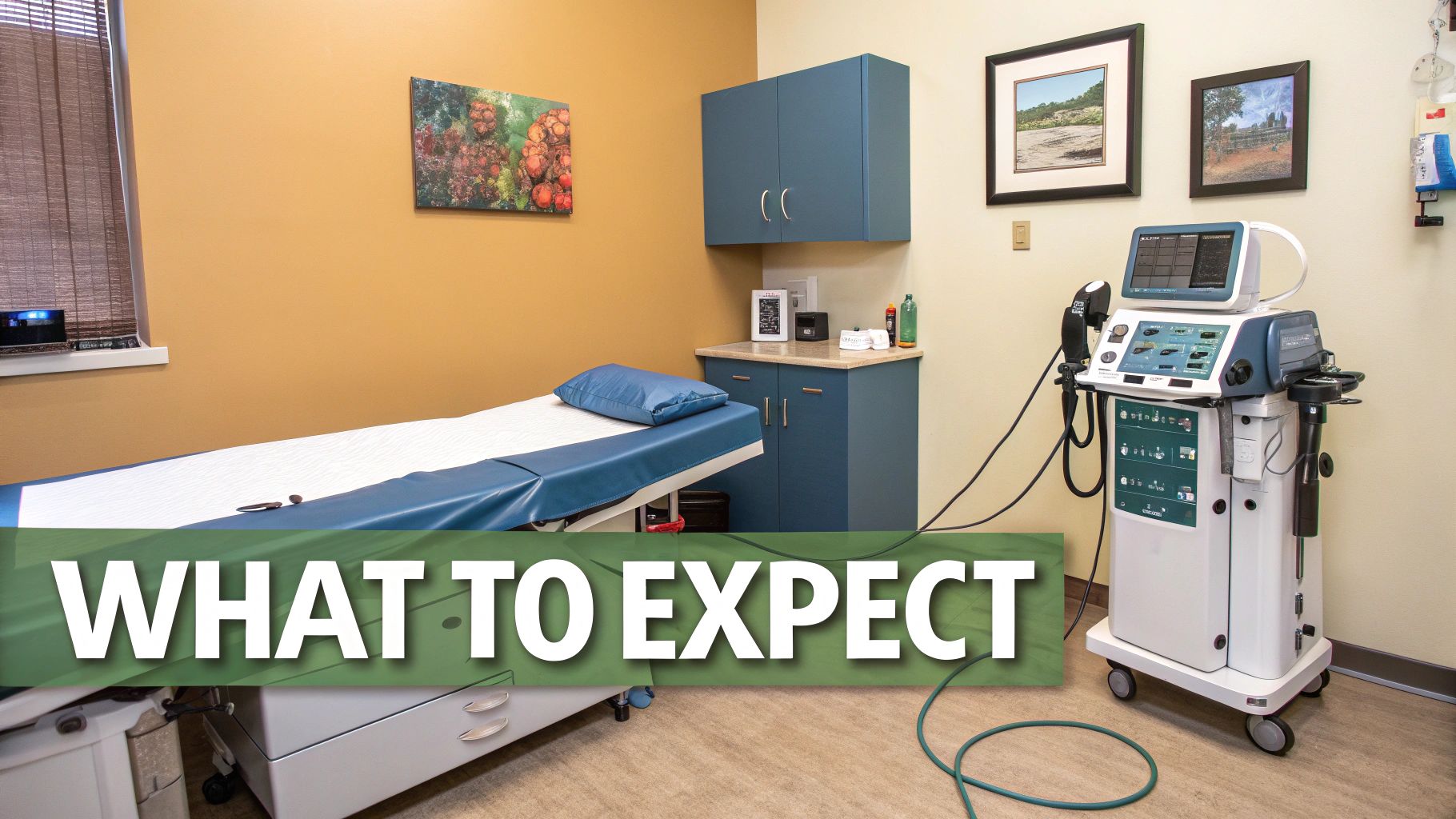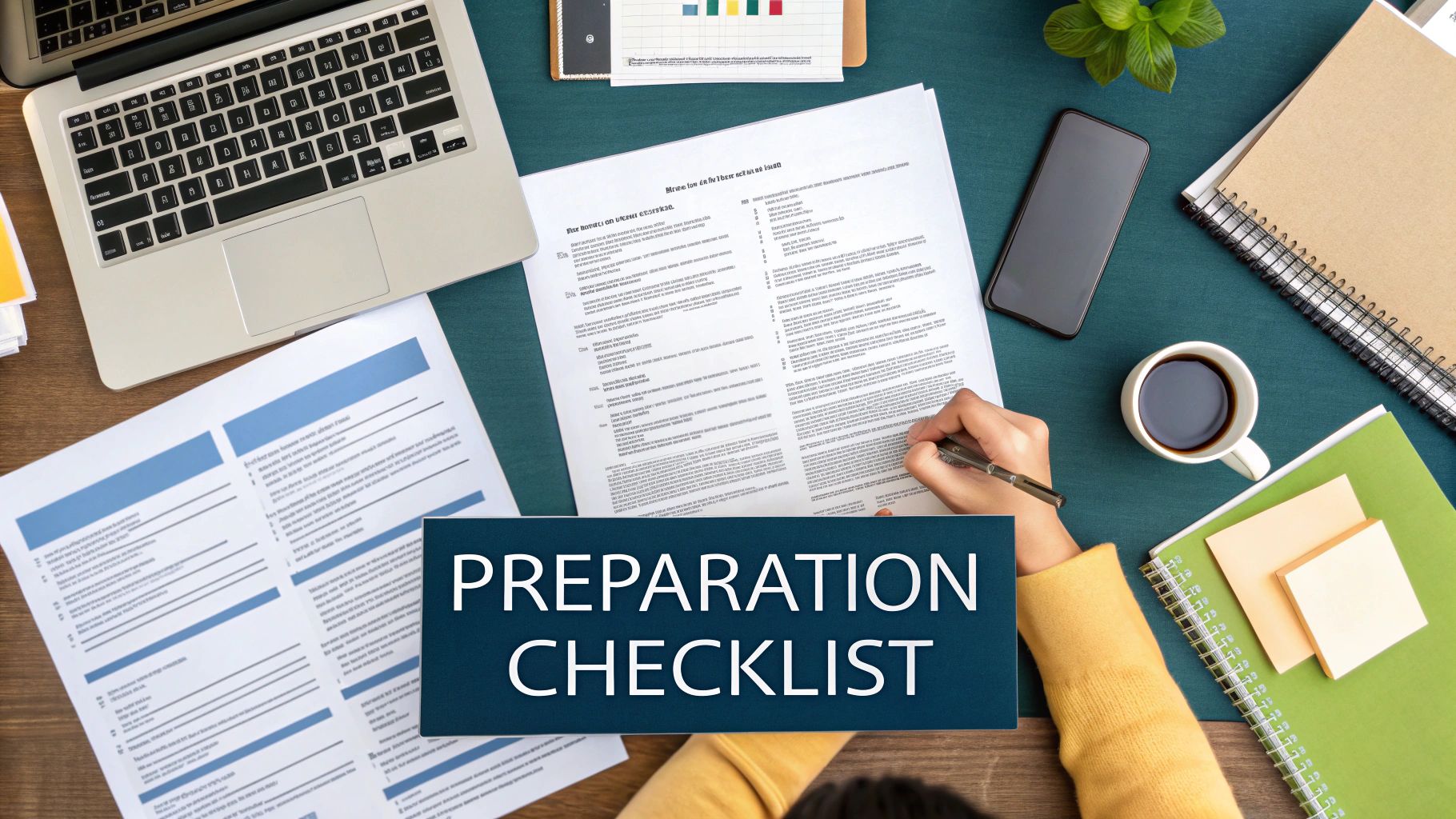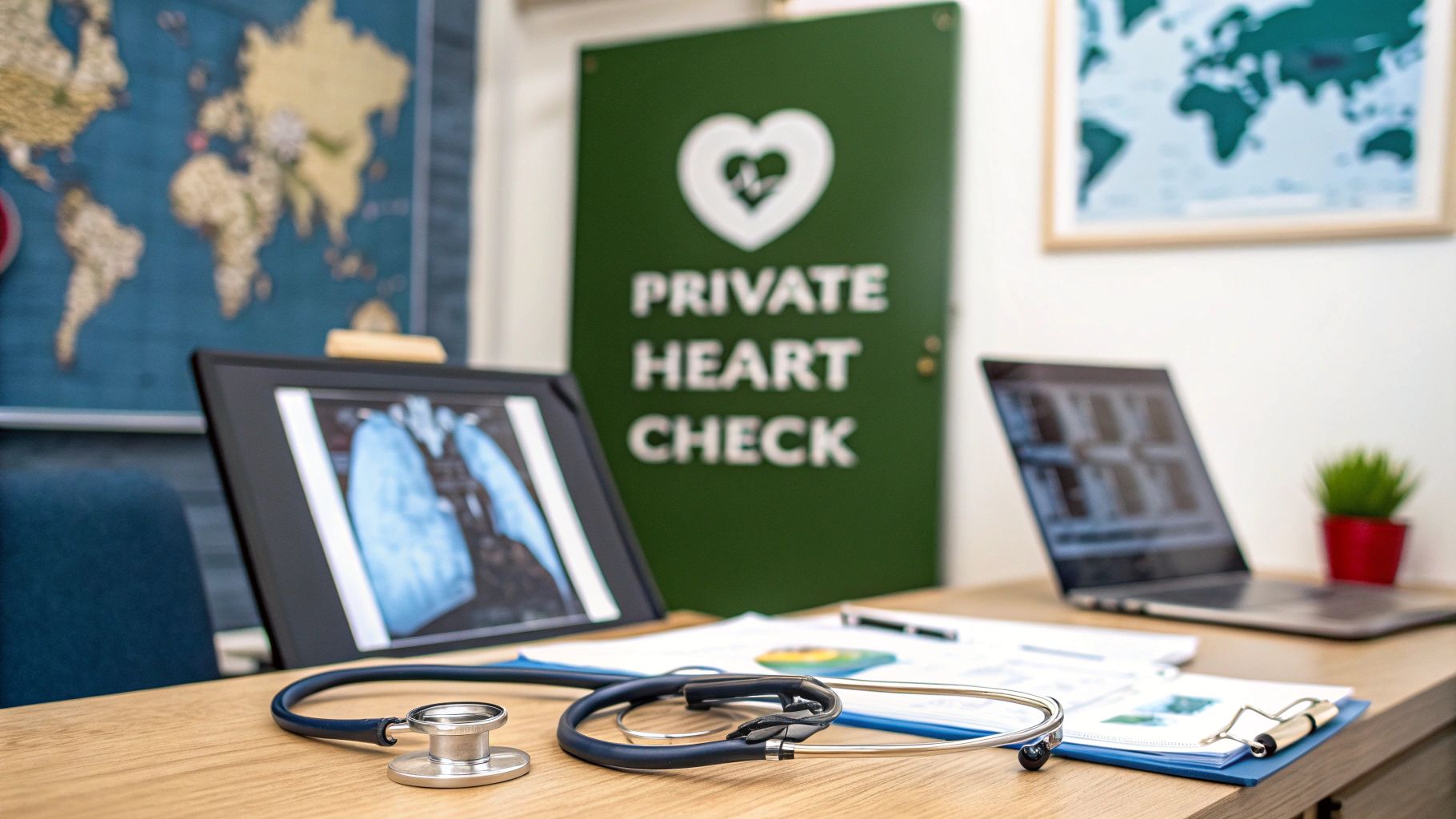.webp)
A private heart check is a detailed medical assessment focused squarely on your cardiovascular health, performed outside the standard NHS pathway. Think of it as a proactive MOT for your heart, using advanced diagnostics to spot potential risks before they turn into serious problems.

Many of us wait until something feels wrong before we pick up the phone to the doctor. But when it comes to heart health, the first symptom can often be a major event like a heart attack. A private heart check completely flips this script, shifting you from a reactive to a proactive mindset.
It's just like servicing your car. You don't wait for the engine to seize up before getting an oil change; you carry out regular maintenance to prevent a breakdown. A private heart check applies that exact same logic to the most important engine you'll ever own.
While the NHS provides outstanding emergency and reactive cardiac care, its resources are understandably stretched, which can lead to longer waits for non-urgent screenings. A private heart check offers a different path—one defined by speed, depth, and a personal touch.
The key advantages often boil down to:
A private screening isn’t about replacing the NHS; it's about supplementing it. It empowers you with a much deeper understanding of your personal risk factors, giving you a clear roadmap for your long-term health.
This proactive approach is really gaining ground. In the UK, demand for private health checks is on the rise as more people realise just how vital cardiovascular wellness is.
With coronary heart disease affecting roughly 2.3 million people in the UK, early and detailed assessments are crucial. A private screening can paint a detailed picture of your heart health, helping to manage and detect diseases that remain a leading cause of death.
Understanding the common risk factors is a key part of this. For instance, learning about the impact of smoking on heart health shows just how much of a role lifestyle choices play.
Ultimately, a private heart check is an investment in your peace of mind and future wellbeing. It’s a core part of any strong preventive healthcare strategy. If you'd like to explore this further, you can learn more about https://www.thevesey.co.uk/blog/what-is-preventive-healthcare in our dedicated guide.
The single greatest advantage of a private heart check is its ability to spot trouble long before you’d ever feel it. Many serious heart conditions, like coronary artery disease, can develop silently for years. Think of it like rust forming on a car's chassis—the damage happens out of sight, and you only find out when something major fails.
Early screening is like getting an expert mechanic to look under the bonnet. It checks for the very first signs of trouble, such as plaque building up in your arteries or tiny irregularities in your heart's rhythm. Catching these problems in their infancy isn't just a good idea; it can turn a potential medical emergency into a completely manageable health condition.
Finding a risk is only half the battle. The real value of a private heart check is what happens next: you get a clear, personalised plan of action. It’s the difference between reading a generic map and having a satnav programmed specifically for your journey, guiding you around any roadblocks.
This process typically unfolds in three key stages, moving from initial screening to a tailored health strategy that fits you perfectly.

This proactive approach is crucial here in the UK, where around 7.6 million people are living with heart and circulatory diseases. A recent analysis of nearly 20,000 blood tests found that 28% of people needed to improve their heart health. It’s the advanced, detailed tests available in a private assessment that provide the insights needed to take meaningful, preventative action.
Beyond the clinical data and action plans, one of the most powerful benefits is simply the peace of mind. For many, the nagging worry about their heart health is a constant source of stress. A comprehensive screening replaces that uncertainty with clarity.
Getting a clean bill of health brings profound reassurance. But if a risk is found, you’re no longer in the dark. You're armed with knowledge and a clear path forward.
A private heart check replaces fear of the unknown with the power of knowledge. It provides a tangible roadmap for managing your cardiovascular wellness, tailored specifically to you for years to come.
This empowerment is everything. Once you know your specific risk factors—whether it's high cholesterol, blood pressure, or early signs of plaque—you can make targeted lifestyle changes that actually work. To learn more, check out our video on how to reduce your risk of heart disease.
Your tailored strategy might include:

Walking into a clinic for a heart check can feel a little intimidating, especially if you’ve never done it before. But knowing what’s coming helps turn that uncertainty into confidence. The whole process is designed to be straightforward, comfortable, and above all, incredibly thorough.
Think of it less like a test and more like a fact-finding mission. You and the specialist are a team, working together to build a complete picture of your heart health. It all starts with a simple conversation.
Your appointment kicks off with a detailed chat with a consultant cardiologist. This is your time to discuss your lifestyle, any symptoms you’ve noticed, and your family's health history. No detail is too small—this context is vital for making sense of your test results.
The specialist will want to get a handle on your personal risk factors, including:
This conversation isn’t just small talk; it sets the stage for everything that follows. It helps us tailor the diagnostic tests to your specific situation, ensuring we get the most relevant insights into how your heart is performing.
Once the consultation is done, you’ll move on to the diagnostic tests. These are all non-invasive procedures designed to give the specialist a comprehensive look at your heart from different angles. Each test tells a unique part of the story.
The most fundamental test you’ll have is an electrocardiogram (ECG). It’s a completely painless way to record the electrical signals your heart produces with every beat. Small sticky sensors are placed on your chest, arms, and legs, which feed data into a machine that maps out your heart's rhythm.
An ECG is brilliant at spotting irregularities. It can flag abnormal heart rhythms (arrhythmias), find evidence of a past heart attack, or show signs that the heart muscle is under strain. You can learn more about this quick and effective screening tool in our guide to the ECG procedure.
To help explain some of the most common tests you might encounter, we've put together a simple table.
Understand the purpose and procedure of key tests you may encounter during a private cardiac screening.
These tests work together to give us a complete picture of your heart's health.
Another common test is an echocardiogram, often just called an "echo." Think of it as an ultrasound for your heart. It uses sound waves to create live, moving pictures, letting the doctor see its size, shape, and how well the chambers and valves are working. It’s fantastic for checking the heart’s overall pumping function.
These core tests are like the essential instruments in an orchestra. The ECG checks the heart's electrical 'rhythm section', while the echocardiogram assesses the mechanical 'pumping section'. Together, they create a harmonious and detailed picture of your heart's overall function.
Depending on your individual circumstances, more advanced imaging might be needed. A CT Coronary Angiogram is a sophisticated scan that uses X-rays and a special dye to create stunningly detailed 3D images of your coronary arteries. This allows specialists to spot any narrowing or blockages from plaque buildup with incredible precision.
The entire process is designed with your comfort in mind. The clinical team will explain every step, making sure you feel informed and relaxed throughout your heart check. The goal is simple: for you to leave with a clear, solid understanding of your cardiovascular health.

To get the most out of your private heart check, a little bit of prep work goes a long way. Taking a few simple steps beforehand ensures the diagnostic tests are as accurate as they can be, making your consultation far more productive.
Think of it like getting your notes ready for an important meeting—it helps everyone focus on what really matters.
When you arrive prepared, your specialist gets a clearer, more immediate picture of your cardiovascular health. This means the results reflect your true baseline, free from temporary factors like the caffeine from your morning coffee that could easily skew the readings.
We've put together a straightforward checklist to make things simple. Following these steps will help you walk in feeling confident and ready, ensuring you get the absolute maximum value from your time with the specialist.
Check for Fasting Requirements: Some blood tests, especially those looking at cholesterol and glucose, need you to fast. Your clinic will give you specific instructions, but it usually means no food or drink (except water) for 8-12 hours before you come in.
Avoid Stimulants: For at least 24 hours before your screening, it’s best to steer clear of caffeine from coffee, tea, and energy drinks, as well as nicotine. These can temporarily raise your heart rate and blood pressure, potentially affecting the accuracy of your ECG and blood pressure readings.
Dress for Comfort and Access: Pop on some loose, comfortable clothing. For tests like an ECG, the team will need easy access to your chest, arms, and legs, so a two-piece outfit is usually much more practical than a dress or jumpsuit.
Having the right information to hand is just as important as the physical prep. Getting these details together beforehand will streamline the whole process and give your doctor the complete picture they need.
Bringing a full medical and family history is like giving your cardiologist a detailed map of your health journey. It provides essential context that helps them interpret your test results with much greater accuracy.
Be ready to chat about or provide documents for the following:
This simple preparation makes sure nothing gets missed and helps you get the most out of your private heart check.
Deciding to invest in a private heart check is a massive step towards looking after your long-term health, but it’s completely normal to wonder about the price. Getting your head around the financial side of things helps you make a clear-headed decision and appreciate the real value you’re getting.
The cost isn’t just a random number; it’s a direct reflection of the depth, technology, and expert time involved in your assessment. Think of it like buying a car. A basic model will get you from A to B, no problem. But a premium model comes with advanced safety features, a more powerful engine, and a smoother ride. Cardiac screenings are much the same, ranging from foundational check-ups to incredibly detailed, high-tech assessments.
Several things come together to determine the final cost of your private heart check. The price isn’t just pulled out of a hat—it’s directly tied to the level of care and diagnostic detail you’re receiving. Knowing what these factors are makes it much easier to compare different packages and find the right fit for you.
Here are the main drivers behind the price:
When you invest in a private heart check, you're paying for clarity. The cost covers not just the tests themselves, but the expert interpretation and personalised guidance that turn raw data into a meaningful, actionable health plan.
This commitment gives you direct access to top specialists and advanced diagnostic tools, skipping the long waits. If you'd like more insight into the broader benefits, our guide on private medical care gives a helpful overview of what to expect from the private health sector.
To give you a clearer picture, private heart checks in the UK are often sold in tiers. Each level offers a progressively deeper dive into your cardiovascular health, letting you choose an assessment that aligns with your personal risk profile and budget.
While the exact prices will differ from one provider to another, the structure usually looks something like this.
Here's a quick comparison of different cardiac screening tiers to give you an idea of what tests are typically included at various price points.
It’s really important to get clarity on exactly what’s included in the package price. The fee almost always covers the tests, the consultation, and a detailed report. However, any follow-up appointments, further specialised tests, or prescribed treatments would typically be an additional cost. Always ask for a full breakdown so you know exactly where you stand and can budget effectively, with no surprises down the line.
Right, so you've had your private heart check, and now the report is in your hands. It can feel like a pretty significant moment. Looking at a document packed with medical terms and numbers can be a bit daunting, but this is where the real value of the whole process comes into its own. This report isn't some final judgment; think of it more as a personalised roadmap for your health moving forward.
The single most important part of this is the follow-up chat with your specialist. Without their expert context, all that data is just noise. Your cardiologist’s job is to take those findings and weave them into a clear story about your heart, explaining what every number and observation means for you.
Your report will have several key data points. While your doctor will walk you through everything, having a basic idea of what they mean can help you feel more confident and prepared for that conversation.
Here are a few of the usual suspects and what they generally tell us:
Think of your results report as a high-resolution photograph of your heart's current state. The numbers and images are the pixels, but it’s the specialist who helps you see the complete picture, highlighting areas of strength and identifying where a little focus is needed.
After going through the report, the conversation will naturally turn to the big question: what now? This usually leads down one of two paths, and honestly, both are positive because they replace uncertainty with clarity.
One outcome is a clean bill of health. If all your results are well within the healthy range, it’s a brilliant moment of reassurance. Your specialist will then give you tailored advice on how to keep things that way through diet, exercise, and smart lifestyle choices.
The other outcome is creating a proactive plan if a risk factor has been spotted. This isn't a reason to panic; it's a chance to take control. Your doctor will sit down with you and map out a clear, manageable strategy. You can learn more about the different treatment pathways by exploring the services offered by our expert cardiology team.
This collaborative plan might include things like:
As part of your long-term plan, learning about reducing stress naturally can make a huge difference to your overall heart health and well-being. The goal here is to leave you feeling empowered, armed with a clear and supportive roadmap to move forward with confidence.
Stepping into the world of private healthcare can feel a little daunting, and it’s natural to have questions. To give you clarity and confidence, we’ve put together answers to the most common queries we hear about private heart checks.
This is all about giving you straightforward information, so you feel ready and informed to take control of your heart health.
While pretty much anyone can gain from a detailed health MOT, some people are especially good candidates for a proactive heart screen. Think of these as little signposts suggesting that a closer look at your cardiovascular health would be a smart move.
You should definitely consider a private heart check if any of these sound familiar:
At the end of the day, a private heart check is for anyone who wants to stop reacting to health issues and start getting ahead of them. It's about gaining real peace of mind.
This is a really common—and important—question. The honest answer is: it depends on your specific private medical insurance policy. Most plans are set up to cover the costs of diagnosing and treating conditions once you already have symptoms, rather than for purely preventative screenings.
That said, things are starting to shift. Some of the more comprehensive insurance policies are now including a wellness or preventative health benefit, which might go towards the cost of a screening like this.
The only way to know for sure is to speak directly with your insurance provider. Be specific and ask them about your cover for "preventative health screenings" or "cardiac risk assessments". They'll be able to tell you exactly what your plan includes.
There’s no one-size-fits-all answer here. The right frequency for a private heart check is a personal thing and should be decided in a conversation with your doctor, based on your own health picture.
The ideal schedule for you will hinge on a few key things:
The main goal is to get a baseline reading of your heart health and then keep an eye on it over time. This way, if any changes pop up, they can be dealt with early.
At The Vesey, our commitment is to provide you with exceptional care and total clarity on your health journey. If you’re ready to get proactive and truly understand your heart health, take a look at our specialist services and book your consultation today. Find out more at https://www.thevesey.co.uk.

